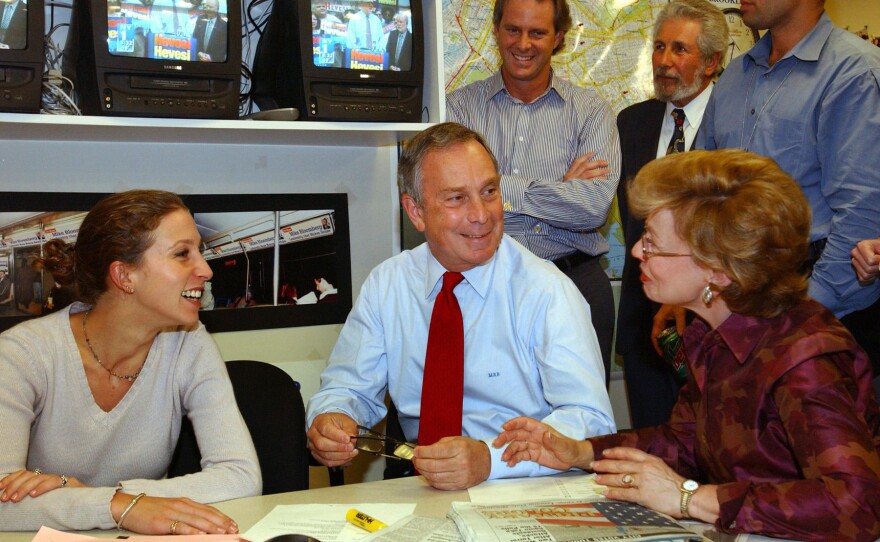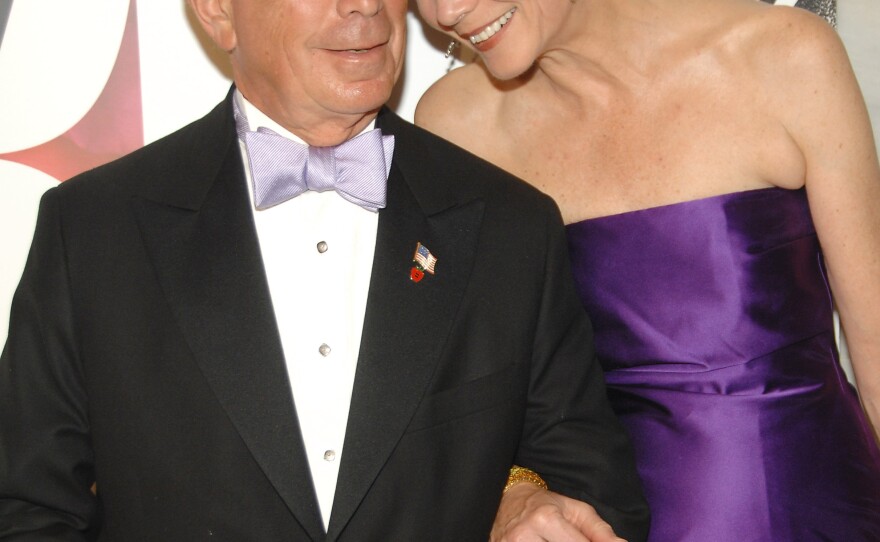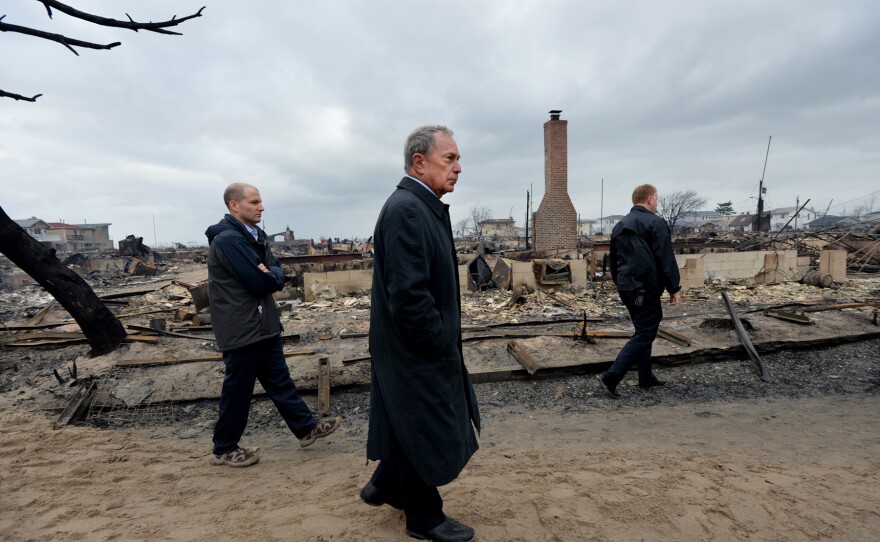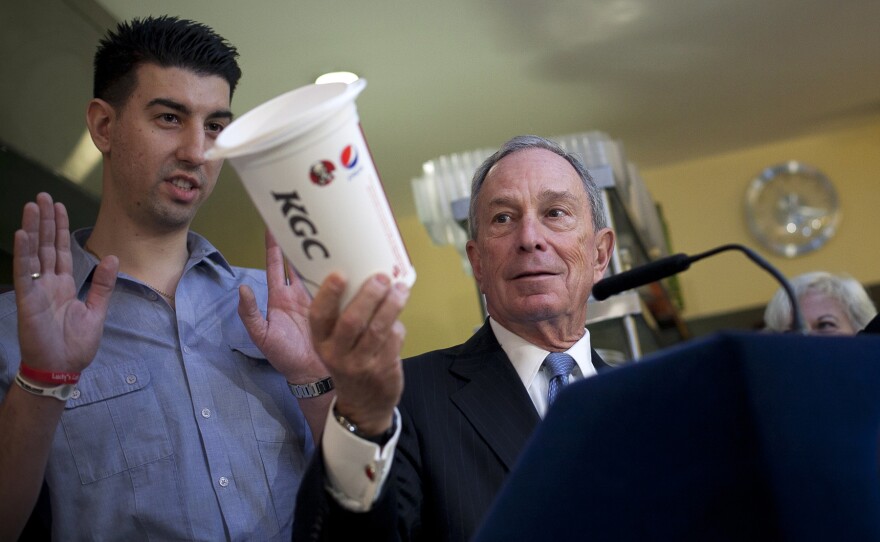At the end of this month, Michael Bloomberg ends his three terms as mayor of New York City. Assessing Bloomberg's legacy, a man who went from Republican to Independent, is not a simple thing to do. His 12 years in office were groundbreaking, locally and even globally.
But at the same time, many New Yorkers found him arrogant and insensitive to the poor. It's a vein that was tapped successfully by Democratic Mayor-elect Bill de Blasio, who described New York as a city of haves and have nots. But the changes implemented by Bloomberg will impact generations of New Yorkers to come.
"Mike Bloomberg has done things that no other mayor has ever been able to achieve, and his record over 12 years is going to turn out to be unmatchable," says Mitchell Moss, a professor of urban planning who advised the mayor in the early days of his administration.
Moss says Bloomberg changed the face of the city through rezoning. "He took the waterfront, which had been in decay since the 1950s, and connected people with the waterfront with new parks and new housing. This city is now stronger than it's ever been. There are people who are living in places where no one went before. We have people who are traveling on the subway at all hours. It's busy 24 hours a day."
Bloomberg revamped the board of health to deal with modern illnesses like obesity and diabetes. He banned smoking in the workplace, required chain restaurants to post calorie counts, banned trans fats, posted letter grades in restaurants and prohibited smoking in parks and on beaches. The mayor often says, "Life expectancy in our city is now three years longer than it was in 2001 and more than two years longer than the national average."
These successes were noted in other cities that copied them. Bloomberg even tried to ban large sugary drinks from movie theaters and restaurants, but he failed.
Professor Moss argues that Bloomberg made New York a laboratory with global impact. "Over 35 countries around the world have copied New York," he notes. "They have even banned smoking in the Irish bars. A Dublin pub was defined by smoke as well as by beer."
Bloomberg also inserted himself in national politics — for example, co-founding Mayors Against Illegal Guns.
Accusations Of Insensitivity
So, with all of this, where did the anger that propelled progressive de Blasio into office come from? Many New Yorkers thought Bloomberg was tone-deaf to people who were struggling.
City Councilman Jumaane Williams says Bloomberg could have done so much more "had we had a mayor that wasn't as arrogant, and had we had a mayor who wouldn't mind listening to opposing points of views."
At the same time that Bloomberg was celebrated for bike paths, smoking bans and glittering skyscrapers, hundreds of thousands of young minorities were experiencing a very different city at the hands of New York's police. Under the "stop and frisk" policy, they could be stopped and searched without a warrant.
Although the numbers have since declined, in 2011, more than 600,000 mostly black and Latino men were stopped, questioned and searched. Almost 90 percent were not charged; they were innocent according to NYPD reports. The issue is still in the courts. Protests against the policy were held all over, including at City Hall.
City Councilwoman Letitia James will soon have de Blasio's old job: public advocate. On the steps of City Hall, she called out to Bloomberg: "All that we are asking is that you come to the table and recognize that the rights of individuals have been violated. They did absolutely nothing wrong, and all that they wanted was to be treated as equals."
The Bloomberg administration has argued that "stop and frisk" made the city safer. The mayor went so far as to say the number of minorities stopped was not a disproportionate percentage of those committing or experiencing crime. "In that case I think we disproportionately stop whites too much and minorities too little," he said — a statement many viewed as insensitive.
Councilwoman James ticks off the various constituencies left out of Bloomberg's New York success story: 1.7 million individuals living below the poverty level. "If you talk to individuals," she says, "particularly those in public housing, over 800,000 in public housing, they would give him a failing grade."
Here's a stark fact: There are almost 52,000 people in the city's homeless shelters. That's more homeless people in New York City than at any time since the Great Depression. At one point, Bloomberg said the reason for that is that the shelters are now so pleasant.
'We Love The Rich People'
Patrick Markee, policy director for the Coalition for the Homeless, says the number of homeless people in New York City shelters has grown by 65 percent since Bloomberg took office. And one-third of those living in shelters are working, sometimes two or three jobs, Markee says. They just can't afford the rent.
But Bloomberg supporters argue that the whole issue of inequality in the city has more to do with federal and state tax and spending policy, not the actions of the mayor.
Sometimes the phrases Bloomberg uses are interpreted differently depending on one's class. Take this comment the mayor made on his weekly radio show: "We want the rich from around this country to move here. We love the rich people; they are the ones who buy in the stores so that people who work in the stores have jobs in the stores and generate sales tax. The rich are the ones that go to the expensive restaurants."
If you are a struggling New Yorker, priced out of where you've lived, you might find those words insulting.
Errol Lewis, the television host of Inside City Hall, told local NPR station WNYC, "Economically speaking, the elevator is broken. There are people who are stuck on the lower floors, they are trudging up the stairs, and they see a big party happening up in the penthouse. They're saying, 'Look, when are we going to get the elevator fixed? We want to get up there.' "
But many wealthy and upper-middle-class New Yorkers understand Bloomberg's statement differently. They see New York as a city competing with Paris, Berlin and London. Tourist dollars pour in; real estate prices continue to rise.
Mitchell Moss points out that in 2003 Bloomberg raised property taxes on the rich by 18 percent, which helped cushion New York during the economic downturn. He says New York City has a social contract: "We tax the wealthy, which is then used to pay largely for schools and social services and safety. This is not an administration which says we want the wealthy just to have them here; we want them because they are helping to support the overall government."
Standing Firm Amid Controversy
For some, Bloomberg's personal wealth has been proof that he couldn't be bought. He said what he wanted even when it wasn't politic. He said no when the Stock Exchange wanted a new building. He put out an ad for gay marriage, which he supported long before it was legal in New York.
But for me, who has reported on this city all through the Bloomberg years, there is one moment that stands out. There was a huge debate over whether an Islamic cultural center and mosque should be built a couple of blocks from ground zero. People were passionate. This was close to where planes brought down the World Trade Center on Sept. 11. There were protests and marches and community meetings. But Bloomberg was defiant — willing to go against the mood and fears of a nation.
"If we say no to the mosque," he said, "we would undercut the values and principle that so many heroes died protecting, and we would hand a valuable propaganda tool to terrorist recruiters, who spread the fallacy that America is at war with Islam. Today we are not at war with Islam — we are at war with al-Qaida and other extremists who hate freedom."
Mayor-elect de Blasio talks of a tale of two cities, and there's truth in that. But as a reporter covering a man who spoke his mind no matter what, it was often a pleasure.
Copyright 2020 NPR. To see more, visit https://www.npr.org. 9(MDAwMTM1NDgzMDEyMzg2MDcwMzJjODJiYQ004))















